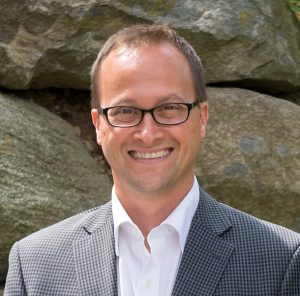A Promise Fulfilled: UW-Madison’s MS in Biotechnology fuels Wisconsin’s biosciences economy
Program celebrates 20 years in 2022
“There was a promise made to the state by the Wisconsin state government and UW-Madison that investing in biotechnology would pay dividends, and that investment has advanced medical discoveries while creating new companies and jobs.”
Kurt Zimmerman, Senior Director, Office of Biohealth Industry Partnerships and Director, Master of Science in Biotechnology Program, at the University of Wisconsin-Madison School of Medicine and Public Health.

The UW-Madison MS in Biotechnology program launched in 2002 to deliver an interdisciplinary curriculum in science, business, regulatory policy, and law that would prepare students to lead product development in the biotechnology industry. The program was developed by a collaboration between the UW-Madison School of Medicine and Public Health and leading regional biotech companies, with support from the administration of then-Governor Tommy Thompson to spark its launch. Twenty years later, the program continues to build Wisconsin’s biosciences industry, prepare students to drive the industry forward, establish strong industry partnerships, and advance life-saving discoveries.
“The Thompson administration aligned with the university to fuel the power of translational research and the power of biotech, and what it would mean for the future. Wisconsin has emerged as a powerhouse,” says Kurt Zimmerman, Senior Director, Office of Biohealth Industry Partnerships and Director, Master of Science in Biotechnology Program, at the University of Wisconsin-Madison School of Medicine and Public Health. “There was a significant investment made, with the promise there’d be an economic return to the state, along with the medical advances biotech offers. The state’s support made it possible for the MS in Biotechnology to launch very quickly, in a way that really matched the pace of progress happening in the field at that time.”
Building Wisconsin’s biosciences industry
An in-person master’s program designed for working professionals, the MS in Biotechnology program resides in University Research Park, where many of Wisconsin’s fledgling biotechnology companies incubate.

“Many of Wisconsin’s most successful biotech companies today began as startups with UW or WARF ties and either grew into established homegrown companies or have been acquired by global biotech companies as valued additions to their operations,” says Bryan Husk, Associate Director of the program.
“We’ve become a global player as a result of local success. Skilled biotech talent with cross-functional leadership knowledge is at a premium.”
The program’s two-year curriculum integrates science, business, law, and regulatory policy, to prepare students to take the next step in their careers and become leaders in their organizations.
“The entire curriculum fuses those topics together to narrate the story of product development in this field for students,” says Zimmerman. “Delivered through a collaboration of university researchers and industry professionals who teach side by side, the curriculum explores how cutting-edge research discoveries are vetted and refined to become new commercial biotech products, including tests and treatments for diseases and other health-related conditions.”
Biotech companies in Madison and Dane County continue to thrive, with extensive job growth during the COVID-19 pandemic. In fact, there were over 1,000 biotechnology job openings in Dane County in October 2021 and over 800 in March 2022.
“The UW-Madison MS in Biotechnology has been such a fantastic partner to Wisconsin’s Biohealth industry for 20 years,” says Lisa Johnson, CEO of BioForward Wisconsin, the collective voice of Wisconsin’s biohealth industry. “Currently, like most industries, Wisconsin’s Biohealth industry needs to retain and attract talent. It is extremely important that our industry has a partner like the UW-Madison MS in Biotechnology. It demonstrates to talent that our companies are investing in their professional development through a high-quality program that will greatly enhance their skills, allowing for career advancement.”
Preparing students to drive the industry forward
The majority of the program’s over 400 graduates–about two-thirds–have remained in Wisconsin, helping to build the biotech industry, working at companies like Promega, Labcorp, Exact Sciences, Thermo Fisher Scientific, Aldevron, and Illumina.

“The MSBT program fills a need for employees who have a scientific background but who want to understand the larger context of how the biotech industry works,” says Jessica Martin Eckerly, director of Forward BIOLABS and an alumnus of the program, who also taught in the program this year.
“Students learn about and practice scenarios from both startup and larger company perspectives. My Forward BIOLABS team and I have talked about how the program was instrumental in understanding industry drivers, business practices, and opportunities.”

Victor Jarjue, Product Manager at Verona-based biotech startup Gentueri, entered the program hoping to build upon the scientific knowledge he had gained from his Biomedical Sciences undergraduate degree and career as a Medical Laboratory Scientist. He planned to work on the research and development of clinical assays for the diagnosis of diseases after graduation. One semester into the program, product development captured his interest, and he changed plans.
“I gained an appreciation for all the business development processes and regulatory activities that go into the development of a biotechnology product from concept to market release,” Jarjue says. “This realignment of my goals led me to my current role as a product manager at Gentueri, Inc., where I am mostly involved in product development.”
Jarjue works closely with all departments to ensure that Gentueri’s products meet user needs and are compliant with regulatory requirements.
“Thanks to the versatility of the Biotechnology Master’s program, which covers three vital areas in biotechnology–science, business and regulation, I was able to discover a career path I never would have imagined before enrolling in this amazing graduate program,” Jarjue says.
Establishing strong university-industry partnerships
The MS in Biotechnology program prepares students to play key leadership roles in the industry and partners with companies to ready their employees to fill those positions. Courses are offered on evenings and weekends, so students can work full-time while earning their degree. Industry leaders teach in the program and share the latest breakthroughs in commercial science, while a WARF executive team teaches the intellectual property, patents, and licensing course.
“We rely on industry feedback to keep the program ahead of the curve,” says Zimmerman. “The entire biotech community has embraced the program.”

Lisa Johnson’s first life science company, Novagen–now Millipore-Sigma–was one of the first companies to send employees through the program.
“Our employees appreciated the investment we were making into their professional development, and Novagen benefited from these employees gaining enhanced skills and leadership development, which improved our company’s performance,” Johnson says.
Husk is noticing two exciting trends: Biotechnology companies establishing sites in Madison and hiring local talent, and global life sciences companies who are hiring Madison employees to work virtually for them. In many cases, companies headquartered outside of Madison, like Illumina, Luminex, and Arrowhead Pharmaceuticals, decide to invest in Madison, which they have designated as a growth region with a strong talent pool.
“Illumina, which is headquartered in San Diego, built a biomanufacturing facility in University Research Park, and their executives have been so pleased with their Wisconsin investment that they’re announcing job openings here that were previously only offered in California,” says Husk. “I have enjoyed building strong relationships with industry partners as companies place increasing value on human and intellectual capital and resources for growth.”
Husk also has enjoyed watching the program’s students and alumni over the past 20 years fulfill the program’s founding mission to see graduates become leaders in Wisconsin’s life sciences industry.
“We have established a high-quality degree and created resources for people to relocate to Wisconsin for jobs,” he says. “The benefits to our students and the companies who employ them are real and lasting.”
Advancing lifesaving discoveries
Program alumni contribute to lifesaving discoveries. Martin Eckerly’s team at Forward BIOLABS incubates biotech startups who become major players in the industry. Tobias Zutz, a 2012 graduate of the program, started Gregor Diagnostics in 2016 to develop a prostate cancer screening test, using seminal fluid as the source. And 2016 graduate Michael Matter, who started his career at Exact Sciences as a Senior Research Associate, earned his MS in Biotechnology degree, and has since advanced within the company as an R&D Supervisor. Matter researched future lung cancer screening techniques as part of his Capstone project and continues to explore the topic at Exact Sciences. And Husk says many program alumni are involved in cell and gene therapy development.
“With advent of the gene-editing tool, CRISPR, there’s a growing effort to develop cures for genetic diseases in safe and ethical ways, and subsequently, I’m seeing more graduates take up leadership roles in companies working on next-gen cell and gene therapies,” says Husk.
Looking forward
Program staff intend to maintain the program’s quality and rigor and stay ahead of the curve, rolling out new professional certificates and industry competency badges in future growth areas related to biotechnology and human health. The program also supports an entry-level online MS in Applied Biotechnology degree and a Capstone Certificate in Applied Bioinformatics, in partnership with UW Extended Campus.
The MS in Biotechnology program continues to grow, admitting its two largest cohorts in the past two years.
“We’re thrilled it’s had a global impact, drawing talent to Wisconsin and building our reputation,’ says Zimmerman. “Major companies, like Aldevron, Arrowhead, and Illumina are putting down footprints, and we can help deliver the workforce to their large facilities and support the investment they’re making in Wisconsin.”